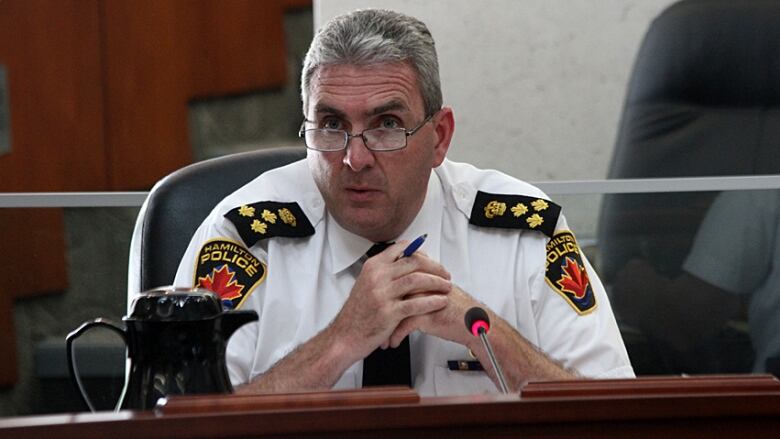Hamilton Police chief: Limiting carding will make Hamilton less safe
Chief Glenn De Caire files letter with province on carding/street checks

Hamilton Police Chief Glenn De Cairesays Hamilton will be less safe and crimes will go unsolved if the controversial tool known as street checks, or carding, is limited or abolished.
There will be "unintended consequences" in limiting street checks,De Caire warnsin a strongly worded defence of the controversial policing tactic used in cases where a person is questioned but may not have done anything wrong.
If they'reabolished, it would cripplethe police ability to investigate drug and gang crime, he argues.
"Information must be gathered before it can be analyzed and interpreted. The public expects us to solve crime."
He lays out a dire eventuality:"The result of reduced officer-community engagement can lead to increased crime, violence, injury and death."
De Caire makesthese arguments in a submission tothe provincial Ministry of CommunitySafety and Correctional Services, which is drafting new provincial regulations for the practice.The chief's letter isincluded in the agenda for theHamilton Police Services Board meetingThursday. Two community members will also be speaking aboutstreet checks at the meeting.
While the chief supports the province clarifying the practice andissuingnew standards and regulations, he doesn't include specifics about what he thinks those regulations should look like.Nor does heprovide a description of howHamilton Police conduct street checks.
Beyond a few anecdotal examples, the service has not provided data showing how many of the more than 9,000 street checks done since 2010 have played a role in solving acrime.
The lettermirrors theremarks De Caire has passionately delivered to the board about the risks he sees in limiting the police's ability to stop, ID and record information indefinitely from people who may or may not ever be formally investigated. The province, in beginning its review, describedthe street checks in question as noncriminal stops, "unrelated to a specific criminal investigation or police function."
He referencesan Ontario Human Rights Commission report on the practice, but does not explicitly endorse its recommendations, which in fact would significantlylimit the street check tool and would eliminate officer "hunch" as a reason to stop and ID someone.
- Police board won't ask chief to suspend carding while province drafts new rules
- Packed Hamilton forum demands end to police carding
- Hamilton Police carding form is 'almost a carbon copy' of Toronto's
- Do Hamilton Police actually card black people disproportionately?
Limits to charter protections
In street checks, colloquially called carding in Toronto, police can ask for ID, take down information about the person's appearance, whereabouts and "affiliations," and record that information forever in the police database. The form Hamilton officers use has more than 65 fields they can fill out.
All rights have limitations.- Glenn De Caire, Hamilton Police Chief
The chief acknowledges the interactions causing "tension" come "in circumstances thatdo not meet the legal test for 'detention' under the Charter [of Rights and Freedoms]."
He says charter protections have to be balanced against community safety.The courts have ruled that police activity like RIDE checks can supercede the Charter right not to be arbitrarily detained, he argues.
"All rights have limitations," he said.
The chief juxtaposes the street check conversation with one of the highest-profile crimes in Hamilton this year, the May daylight shootings involving two black male suspectson Main Street East.
The community expects police to show up in the area to stop, talk to and investigate young black males, the chief said.
"How do the police intervene to stop gun violence, get guns off the street, or dismantle criminal organizations without stopping and talking to people and recording their information?" the chief asks.
The chief's question raises more questions.
Hamilton Police say they've only done street checks since 2010, and only their ACTION team uses them, mostly downtown. So how have police traditionally stopped gun violence, gotten guns off the street or dismantled criminal investigations before Hamilton officers used street checks?
Officerdiscretion
Much of the controversy around street checks centres on the disproportionate impact of the practice oncommunities of colour.Black residents, for instance, make up 3 per cent of the Hamilton population but 11 to 14 per cent of the street checks a rate ofthree to four times the population. Even restrictedto downtown, where police say they focus street checks, the rate of being street checkedis still disproportionate for black residents.
In the letter, the chief states explicitlythat "a police officer must not activate any of their policing authorities based on race."
"However, I am in full support of our officers exercising their discretion to stop, investigate, identify and record information of individuals in the appropriate circumstances," he said.
What that discretion and appropriate circumstances are, he doesn't explain.
Here are the circumstances the Ontario Human Rights Commission suggests should notbe reason enough to stop someone:
- An unspecified future offence or criminal investigation;
- A "hunch" or unsupported suspicion or belief, whether based on intuition gained by experience or otherwise;
- Mere presence in a particular neighborhood, high-crime neighborhood or "hot spot";
- A suspect, victim or witness description that lacks sufficient detail other than race;
- Meeting a quota or performance target for number of stops or street checks; and
- Raising awareness of police presence in the community.
Glenn De Caire letter to Ministry of Community Safety and Correctional Services (PDF 1300KB)
Glenn De Caire letter to Ministry of Community Safety and Correctional Services (Text 1300KB)CBC is not responsible for 3rd party content












_(720p).jpg)


 OFFICIAL HD MUSIC VIDEO.jpg)
.jpg)



























































































